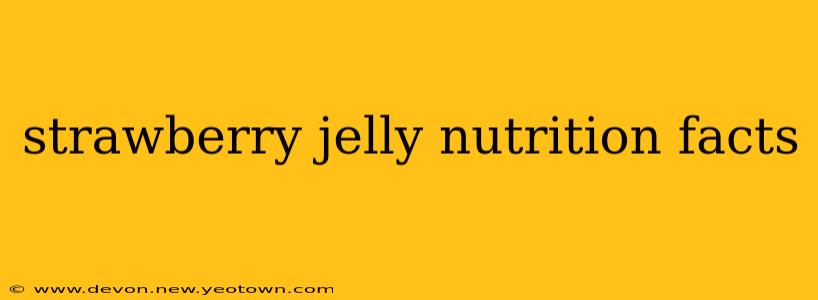Strawberry jelly. The vibrant red shimmer, the sweet burst of flavor… it's a nostalgic treat many of us associate with childhood. But have you ever stopped to consider the nutritional content hidden within those seemingly simple cubes? Let's dive into the surprising world of strawberry jelly nutrition facts, exploring what's truly in that jar and answering some frequently asked questions.
What are the main nutritional components of strawberry jelly?
The nutritional profile of strawberry jelly is primarily characterized by its carbohydrate content. It's essentially a concentrated source of sugars, predominantly sucrose, fructose, and glucose, derived from the strawberries and added sugar during processing. While it provides some small amounts of vitamins and minerals, these are typically negligible compared to the sugar content. The specific amounts vary considerably depending on the brand and recipe, with some containing added pectin, acids for setting, and artificial colors or flavors.
Think of it this way: the sweetness you enjoy comes at a cost. While strawberries themselves contain beneficial vitamins and antioxidants, much of that is lost or significantly reduced during the jelly-making process. The final product is mostly sugar and water, with a minimal contribution from the original fruit.
Is strawberry jelly a good source of vitamins and minerals?
This is where the reality check comes in. While strawberries are packed with Vitamin C and other antioxidants, the jelly-making process significantly depletes these nutrients. The resulting jelly offers minimal amounts of vitamins and minerals. You won't find a significant source of vitamins or minerals to speak of here. It's far better to consume whole strawberries to reap their nutritional benefits.
How many calories are in a serving of strawberry jelly?
The calorie count in strawberry jelly primarily stems from its high sugar content. A typical serving (around one tablespoon) can range from 40 to 60 calories, depending on the brand and recipe. These calories are mostly "empty calories," meaning they provide minimal nutritional value beyond energy.
Does strawberry jelly contain fiber?
No, strawberry jelly contains very little to no fiber. The fiber found naturally in strawberries is largely lost during the processing and extraction of the juice used to make jelly. The resulting product is a smooth, almost completely fiber-free confection.
Is strawberry jelly good for weight loss?
Considering its high sugar and calorie content with minimal nutritional value, strawberry jelly is not considered conducive to weight loss. It's a high-calorie, low-nutrient food that can contribute to weight gain if consumed regularly in significant amounts. A small, occasional serving might not severely impact weight loss goals, but it shouldn’t be relied on as a regular part of a weight-loss diet.
What are the potential health risks associated with eating too much strawberry jelly?
Excessive consumption of strawberry jelly, like any high-sugar food, can contribute to several health problems. These include:
- Weight gain: High sugar intake leads to excess calorie consumption, potentially leading to obesity.
- Type 2 diabetes: High sugar intake can increase the risk of developing type 2 diabetes.
- Dental problems: The high sugar content can contribute to tooth decay and cavities.
- Heart disease: High sugar diets are linked to an increased risk of heart disease.
How can I make healthier choices instead of eating strawberry jelly?
Instead of reaching for strawberry jelly, consider these healthier alternatives:
- Whole strawberries: Enjoy the natural sweetness and abundant nutrients of fresh or frozen strawberries.
- Fruit salads: Combine various fruits for a delicious and nutritious treat.
- Homemade fruit preserves: Make your own preserves with less added sugar, focusing on whole fruits.
Strawberry jelly, while delicious, should be enjoyed sparingly as part of a balanced diet. Its nutritional value is limited, and excessive consumption can negatively impact your health. Prioritizing whole fruits and other nutrient-rich foods will ensure you get the vitamins, minerals, and fiber your body needs. Remember, moderation is key!

